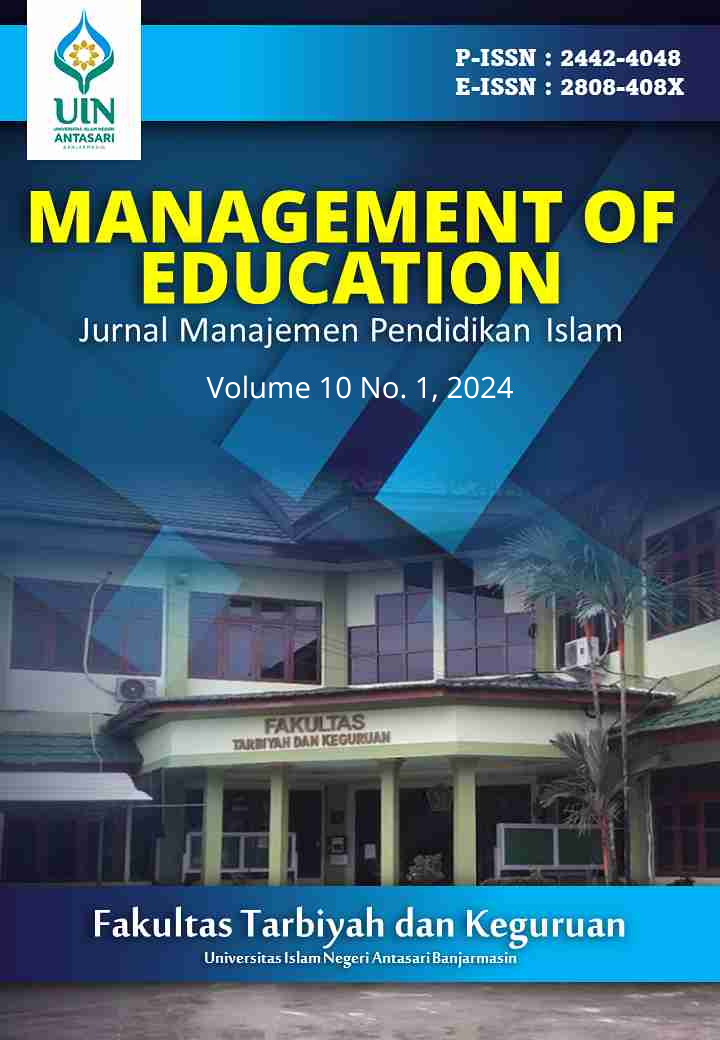Pelatihan dan Pengembangan Guru Sebagai Sumber Daya Manusia Bidang Pendidikan di Era Kecerdasan Buatan (AI)
DOI:
https://doi.org/10.18592/moe.v10i1.12037Keywords:
Pelatihan, Pengembangan Guru, Sumber Daya Manusia, Kecerdasan Buatan (AI)Abstract
The development of Artificial Intelligence (AI) technology has brought significant transformation across various sectors, including education. In this context, the increased role of teachers as human resources playing a crucial part in adopting and implementing AI technology in the classroom has become essential. The research method using a library research approach to analyze the training needs and development of teachers in facing the AI era. This research method is based on literature studies and analysis of relevant documents from sources such as scientific journals, books, and related research reports. The focus is on the impacts arising from the presence of AI in education and identifying the types of training that can be used to prepare and support educators in integrating AI technology into the learning process. The research indicates that the presence of AI has positive impacts on the education world, such as enhancing the effectiveness of learning, aiding teachers in finding in-depth materials, facilitating the creation of local curricula more effectively, and assisting higher education students in composing scientific articles. However, there are still negative impacts, such as students becoming dependent on AI and thus becoming lazy to study.There are various types of training that teachers can undergo to face AI, including Learning and Innovation Skills, Information, Media, and ICT Literacy, and TPACK.References
Annafi Franz, Eny Maria, Suswanto, Yulianto, Budi Rachmadani, Eko Junirianto, Asep Nurhuda, Ida Maratul Khamidah, Suci Ramadhani, Muslimin, Husmul Beze, Reza Andrea, Syafei Karim, Emil Riza Putra, Fajar Ramadhani, Bagus Satria, & Imron. (2023). Pelatihan Penerapan Artificial Intelligence (AI) untuk Menunjang Aktifitas Pembelajaran pada Sekolah Dasar Daarul Hijrah Al_Amin Samarind. JLP : Jurnal Lentera Pengabdian, Volume 01(04), 1–9.
Asnawati, A. (2021). Konsep Manajemen Pendidikan Karakter Dalam Menumbuhkan Akhlakul Karimah Di Mts Raudhatul Islamiyah Kemiri. Management of Education: Jurnal Manajemen Pendidikan Islam, 7(1), 1–7.
Candra, W. A., & Hasan, M. (2023). Tantangan Guru Pendidikan Agama Islam Dalammenghadapi Era Society 5.0 Digital. Unisan Jurnal, 1(5), 301–310.
Fauziyati, W. R. (2023). Dampak penggunaan Artificial Intelligence (AI) Dalam Pembelaaran Pendidikan Agama Islam. Jurnal Review Pendidikan Dan Pengajaran, 6(2), 2180–2187.
Gusli, R. A., Zaki, S., Akhyar, M., Islam, U., Syaikh, N., & Djambek, M. D. (2023). Tantangan Guru terhadap perkembangan teknologi agar memanfaatkan Artificial Intelligence dalam meningkatkan kemampuan siswa. 4(3), 229–240. https://doi.org/10.32832/idarah.v4i3.15418
Hidayanti, W., & Azmiyanti, R. (2023). Dampak Penggunaan Chat GPT pada Kompetensi Mahasiswa Akuntansi: Literature Review. Seminar Nasional Akuntansi Dan Call for Paper, 3(1), 83–91.
Hikmawati, N., Sufiyanto, Moh. I., & Jamilah. (2023). Konsep dan Implementasi Kecerdasan Buatan (Artificial Intelligence) dalam Manajemen Kurikulum SD/MI. Abuya: Jurnal Pendidikan Dasar, 1(1), 1–16.
Jenita, Saputra, A. M. A., Salwa, Wijayanto, G., Asri, H., & Novandalina, A. (2023). Pemanfaatan Artificial Intelligence Dalam Menyusun Artikel Ilmiah Terindeks SINTA. Communinty Development Journal, 4(5), 10292–10299. https://doi.org/10.47668/edusaintek.v11i1.999
Kennedy, P. S. J. (2023). Digitalisasi Pendidikan: Artificial Iintelligence Di Pendidikan Tinggi. Prosiding Nasional 2023, 205–215.
Maufidhoh, I., & Maghfirah, I. (2023). Implementasi Pembelajaran Berbasis Artificial Intelligence Melalui Media Puzzle Maker Pada Siswa Sekolah Dasar. ABUYA: Jurnal Pendidikan Dasar, 1(1), 29–43.
Michael Reskiantio Pabubung. (2021). Epistemologi Kecerdasan Buatan (AI) dan Pentingnya Ilmu Etika dalam Pendidikan Interdisipliner. Jurnal Filsafat Indonesia, 4(2), 152–159.
Mirela, T., & Santosa, S. (2022). Pelatihan dan Pengembangan Sumber Daya Manusia Dalam Lembaga Pendidikan Islam. J-MPI (Jurnal Manajemen Pendidikan Islam), 7(1), 44–54. https://doi.org/10.51614/annaba.v5i2.161
Mutaqin, F. M., Jubaedah, I., Koestianto, H., & Setiabudi, D. I. (2023). Efektif Artificial Intelligence (AI) dalam Belajar dan Mengajar. Jurnal Pendidikan : Seroja, 2(1), 53–60.
Pahlevi, M. R., Ridwan, I., & Kamil, A. B. (2021). Pelatihan TPACK (Technological, Pedagogical, Content Knowledge) Bagi Guru Bahasa Inggris di Kabupaten Karawang Jawa Barat. Jurnal Pengabdi, 4(1), 34. https://doi.org/10.26418/jplp2km.v4i1.43631
Sholeh, M. (2021). Transformational Leadership: Principal Intellectual Stimulation In Improving Teacher Competences. Al-Ta Lim Journal, 28(2), 167–179. https://doi.org/10.15548/jt.v28i2.708
Sholeh, M., Kholis, N., & Mufidah, N. (2022). Madrasah Principal Leadership in Digital Transformation at Madrasah Ibtidaiyah: A Case Study. Dinamika Ilmu, 151–166. https://doi.org/10.21093/di.v22i1.4241
Sunarto, Priyanto, At. S., Susanti, M. H., & Abdilah, Y. A. (2023). Pelatihan Penggunaan Artificial Intelligence Dalam Mendesain Pembelajaran Berbasis Technological, Pedagogical, And Content Knowledge (TPACK) Untuk Guru. Maslahah: Jurnal Pengabdian Masyarakat, 4(3), 177–187. https://doi.org/10.30596/maslahah.v
Suyonto, S. (2019). Pengembangan Kompetensi Guru Menghadapi Era Revolusi Industri 4.0. Prosiding Seminar Nasional Pendidikan Biologi Dan Saintek Ke - IV 2019, April, 23–31.
Tasya Kamila, J., Nurnazhiifa, K., Lara, S., & Setiawati, R. (2022). Pengembangan Guru dalam Menghadapi Tantangan Kebijakan Pendidikan di Era Revolusi Industri 4.0. Jurnal Pendidikan Tambusai, 6(2), 10013–10018.
Tihul, I. (2020). Eksistensi Guru Sebagai Pribadi yang Profesional dan Inspiratif. Alasma: Jurnal Media Informasi Dan Komunikasi Ilmiah, 2(2), 197–206.
Trenggono Hidayatullah, M., Asbari, M., Ibrahim, M. I., Hadidtia, A., & Faidz, H. (2023). Urgensi Aplikasi Teknologi dalam Pendidikan di Indonesia. Journal of Information Systems and Management (JISMA), 2(6), 70–73.
Downloads
Published
How to Cite
Issue
Section
License
Copyright (c) 2024 Imam Taufik, Ida Rindaningsih

This work is licensed under a Creative Commons Attribution 4.0 International License.
Authors who publish with this journal agree to the following terms:
- Authors retain copyright and grant the journal right of first publication with the work simultaneously licensed under a Creative Commons Attribution 4.0 International that allows others to share the work with an acknowledgement of the work's authorship and initial publication in this journal.
- Authors are able to enter into separate, additional contractual arrangements for the non-exclusive distribution of the journal's published version of the work (e.g., post it to an institutional repository or publish it in a book), with an acknowledgement of its initial publication in this journal.
- Authors are permitted and encouraged to post their work online (e.g., in institutional repositories or on their website) prior to and during the submission process, as it can lead to productive exchanges, as well as earlier and greater citation of published work.









 This work is licensed under a
This work is licensed under a 